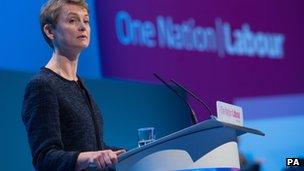Identity theft law change proposed by Labour
- Published

The shadow home secretary accused the government of "turning their backs" on victims
Labour has promised to make it easier to prosecute identity thieves as part of an online crime crackdown.
The number of tech-savvy scams is rising "exponentially", shadow home secretary Yvette Cooper said.
In her speech to the party's annual conference she pledged to create a specific offence of identity theft.
A Labour government would also make lessons about online pornography compulsory in schools, she told delegates in Brighton.
"Fraud is up 30%," she said. "But we know that's the tip of the iceberg because most online crime like credit card and identity fraud goes unreported."
'Higher charges'
Ms Cooper has herself been a victim of credit card fraud, she told the BBC News website, when "like a lot of people" she discovered payments on her bank statement "from strange places" that she had not made.
She reported the problem to her bank, who "immediately sorted it out", but she said the experience highlighted how much card fraud is not properly investigated.
"It became clear that they (the bank) did not expect me to report it to the police, they were not going to report it to the police themselves, and when I did report to the police they were really surprised to have somebody complain.
"And it's clear that most of these credit card cases - a lot of them - are never reported at all and also that the teams that investigate it in the police are still really limited.
"And yet this is a kind of crime that's growing, it's massively escalating, and of course we all pay for it in the end through higher charges, and businesses and banks lose out too."
Ms Cooper used her conference speech to propose a fast-track, "police-first" scheme to encourage IT graduates into policing, she added: "The police say it's growing exponentially, but the government hasn't got a grip."
Car theft
The police have identified 1,300 organised crime groups targeting the UK that use fraud as their main means of gaining money. They are believed to be operating out of 25 different countries.
"Alongside reductions in some kinds of crime like car theft, is an increase in online crime," she told BBC Two's Daily Politics programme after her speech.
"That's there we live our lives are now and of course organised crime knows that too."
On the final day of Labour's conference the shadow home secretary also turned her fire on Michael Gove, who she accused of blocking a proposal to update sex education to include lessons about the internet.
The education secretary and the coalition government had not "faced up to the 21st century pressures on our children", she said.
"We need a Labour government to make sure there is updated sex and relationship education for boys and girls - zero tolerance of violence," she told activists.
If the party wins in 2015 such lessons would be "compulsory too", she added.